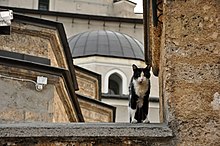Islam and cats

The domestic cat is a revered animal in Islam. Admired for their cleanliness, cats are considered "the quintessential pet" by Muslims.[1]
Origins of reverence
Cats have been venerated in the Near East since antiquity, a tradition adopted by Islam, albeit in a much modified form.[2] According to many hadith, Muhammad prohibited the persecution and killing of cats.[1]
One of Muhammad's companions was known as Abu Hurairah (literally: "Father of the Kitten") for his attachment to cats.[3] Abu Hurairah claimed that he had heard Muhammad declare that a woman went to Hell for starving a female kitten and not providing her with any water.[4] According to legend, Abu Saeed's cat saved Muhammad from a snake.[1]
History

The American poet and travel author Bayard Taylor (1825–1878) was astonished when he discovered a Syrian hospital where cats roamed freely. The institution, in which domestic felines were sheltered and nourished, was funded by a waqf, along with caretakers' wages, veterinary care and cat food. Edward William Lane (1801–1876), a British Orientalist who resided in Cairo, described a cat garden originally endowed by the 13th-century Egyptian sultan Baibars, whose European contemporaries held a very different attitude towards cats, eating them or killing them under papal decrees.[1] Wilfred Thesiger, in his book The Marsh Arabs, notes that cats were allowed free entry to community buildings in villages in the Mesopotamian Marshes, and even fed.[5][page needed] Aside from protecting granaries and food stores from pests, cats were valued by the paper-based Arab-Islamic cultures for preying on mice that destroyed books. For that reason, cats are often depicted in paintings alongside Islamic scholars and bibliophiles. The medieval Egyptian zoologist Al-Damiri (1344–1405) wrote that the first cat was created when God caused a lion to sneeze, after animals on Noah's Ark complained of mice.[1]
Hygiene and neutering
In Islamic tradition, cats are admired for their cleanliness. They are thought to be ritually clean, and are thus allowed to enter homes[1] and even mosques, including Masjid al-Haram. Food sampled by cats is considered halal, in the sense that their consumption of the food does not make it impermissible for Muslims to eat, and water from which cats have drunk is permitted for wudu (the ablution that is done by Muslims).[1] Furthermore, there is a belief among some Muslims that cats seek out people who are praying.[6]
Muslim scholars are divided on the issue of neutering animals. Most, however, maintain that neutering cats is allowed "if there is some benefit in neutering the cat and if that will not cause its death".[7] Muhammad ibn al Uthaymeen, a 20th-century Saudi Arabian Sunni imam, preached:
If there are too many cats and they are a nuisance, and if the operation will not harm them, then there is nothing wrong with it, because this is better than killing them after they have been created. But if the cats are ordinary cats and are not causing a nuisance, perhaps it is better to leave them alone to reproduce.[7]
See also
- Cats in ancient Egypt
- Cultural depictions of cats
- Human interaction with cats
- Islam and dogs
- Moral status of animals in the ancient world
References
- ^ a b c d e f g Campo, Juan Eduardo (2009). Encyclopedia of Islam. Infobase Publishing. p. 131. ISBN 978-0-8160-5454-1.
- ^ Baldick, J. (2012). "Into the modern world". Mystical Islam: An Introduction to Sufism. London, New York: I.B. Tauris & Co. Ltd. pp. 132−168. ISBN 9781860646317.
- ^ Glassé, Cyril (2003). The New Encyclopedia of Islam. Rowman Altamira. p. 102. ISBN 0759101906.
The attachment to cats of one of the Companions, Abū Hurayrah ('Father of the Kitten'), is proverbial.
- ^ Kurzman, Charles, ed. (1998). Liberal Islam: A Source Book. Oxford University Press. p. 121. ISBN 0-19-511622-4.
- ^ Thesiger, Wilfred (1964). The Marsh Arabs. London: Longmans.
- ^ Glassé, Cyril (2003). The New Encyclopedia of Islam. Rowman Altamira. p. 102. ISBN 0759101906.
Stories of cats who seek out persons who are praying, and of cats sensitive to the presence of grace, are common.
- ^ a b Abdul-Rahman, Muhammad Saed (2004). "Chapter 13: Transactions Animal Rights". Islam: Questions and Answers—Jurisprudence and Islamic Rulings: General and Transactions, Part 1. Vol. 22. Herne Hill, London, UK: MSA Publication Limited. pp. 323–325. ISBN 1-86179-411-8.
